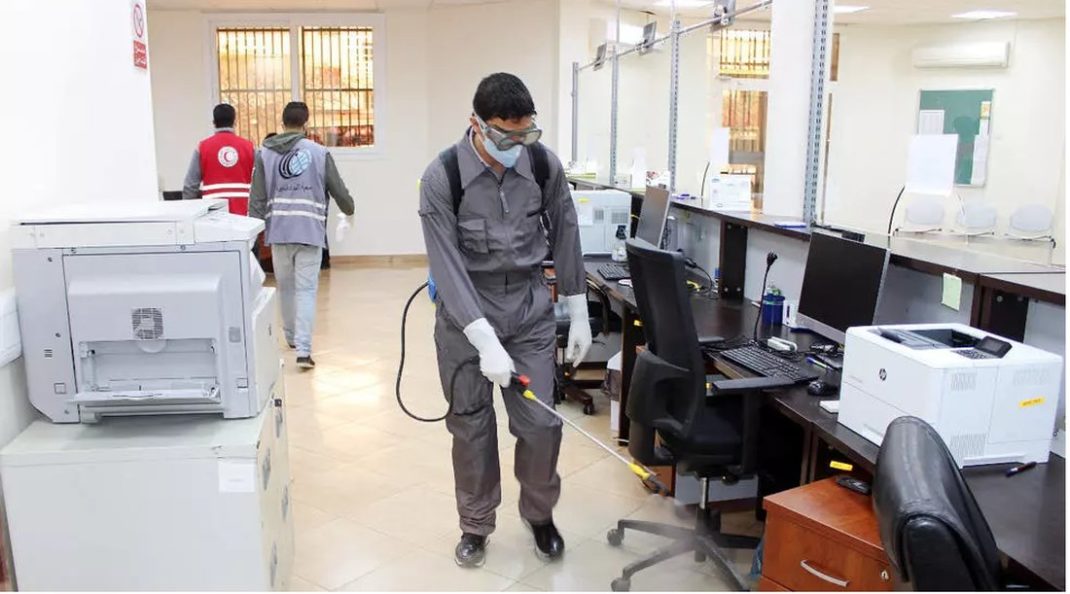By Marc DAOU
 Many observers are fearing the worst after the first coronavirus case was recorded in Libya on March 24, with two rival governments fighting to take control of the country and a health system that has been on its knees for nearly a decade amid the chaos that followed the overthrow of Gaddafi’s regime in 2011.
Many observers are fearing the worst after the first coronavirus case was recorded in Libya on March 24, with two rival governments fighting to take control of the country and a health system that has been on its knees for nearly a decade amid the chaos that followed the overthrow of Gaddafi’s regime in 2011.
Libya’s first coronavirus patient has been placed in isolation in a hospital in the capital Tripoli, according to the health minister in Fayez al-Sarraj’s UN-backed Government of National Accord (GNA).
The patient is a 73-year-old man who entered Libya through Tunisia in early March after staying in Saudi Arabia. His direct entourage – consisting of more than 20 people – tested negative, local media reported.
Initially, it seems that many in Libya thought they were safe from the pandemic that has spread throughout the world, including to the country’s North African neighbours.
“We’re sheltered from the virus in Libya, whose capital is under siege and where land and air links are closed,” Moayed al-Missaoui, an academic, told Agence France-Presse earlier in March.
However, the UN now fears a catastrophic outcome, while the two armed camps – Sarraj’s GNA and Field Marshal Marshal Khalifa Haftar’s Libyan National Army (LNA) – continue their military operations against each other.
This has led to concerns about the risks for civilians who find themselves trapped amid the clashes, as well as for migrants held in detention centres, some of which are located near combat zones.
“We are deeply concerned as the first #COVID19 case is reported in Libya,” tweeted the UN Office for the Coordination of Humanitarian Affairs in Libya.
“The health and safety of all people in Libya, including 345,000 of the most vulnerable, is at risk. A possible outbreak will overwhelm the already stretched aid response.”
Health system ‘already close to collapse’
It is no surprise that the UN body is anxious. Libya’s healthcare system has been in “constant decline” because “too many hospitals and clinics have been damaged during the fighting”, the International Committee of the Red Cross has pointed out.
Despite the efforts of the UN and NGOs, a shortage of qualified personnel, the disruption of supply chains due to the conflict, and the lack of medicine and medical equipment are making healthcare provision difficult – and not just in isolated parts of the country.
“This is a health system that was close to collapse before you get the coronavirus,” Elizabeth Hoff, head of mission for the World Health Organisation in Libya, told Reuters earlier this week.
For its part, the 2019 Global Health Security Index ranks the country at 185 out of 195 for its ability to respond to the spread of an epidemic.
In a sign of their shared awareness of the potential gravity of the situation, both the GNA (whose powerbase is in Tripoli) and the LNA (based in eastern Libya) had anticipated the arrival of the coronavirus by taking preventive measures, imposing night time curfews and closing some public places.
The GNA health ministry urged all medical staff on March 26 to go and work on the frontline in hospitals, where healthcare workers have already been mobilised to be ready for a potential coronavirus pandemic.
The GNA also announced that several quarantine sites, including two in Tripoli, will be set up to isolate people infected with the disease.
‘People are already struggling to access healthcare’
Nevertheless, Ahmed al-Hassi, the spokesman for the Haftar’s Coronavirus Epidemic Advisory Medical Committee said earlier in the week that regardless of the number of beds and intensive care rooms that have been prepared, Libya would be “unable to cope” with an epidemic due to its “limited capabilities”.
“People are already struggling to access healthcare for routine treatment, and hospitals are already struggling with large numbers of victims of the fighting in Tripoli,”
Liam Kelly, Libya director at the Danish Refugee Council, told Jeune Afrique, a Paris-based, Africa-focused weekly. “Measures are being taken across the country, but the weakness of the healthcare system is dramatic.”
Libyans have certainly taken precautions, as demonstrated by products selling out at supermarkets and pharmacies. Stocks of sanitary products such as hand wipes, masks and gloves have been running short, Mounir el-Hazel, who heads a medical imports firm, told Agence France-Presse.
But despite such preventive measures on the part of civilians, the fact remains that the military situation is not conducive to an effective fight against a coronavirus epidemic.
In response to the looming threat from Covid-19, a truce was put in place and accepted by both sides on March 22, under the auspices of several countries and the UN. However, both the GNA and LNA have subsequently accused the other of violating this agreement.
Tripoli was notably the target of bombing during the night of March 24 to 25, while there were reports of fresh clashes on an air base close to the capital that has been targeted in an offensive by GNA forces.
On Wednesday, the United Nations Support Mission in Libya (UNSMIL) lamented the fact that “while the whole world is engaged in fighting the spread of COVID-19, which has overwhelmed well-resourced countries, attacks and counter attacks in Libya continue to inflict further suffering and civilian casualties”.
In light of this, UNSMIL urged an “immediate de-escalation” so that Libyans can “shift their focus to the fight against COVID-19”. But it will be difficult for this call to be heard, considering the absence of a truce respected by both parties.
____________





